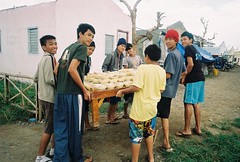
Last month I had the incredible opportunity to partake in the Dubin Fellows New York City Leadership Trip, and I have just recently started to process the entire amazing experience. I joined about 20 Harvard Kennedy School classmates in New York City to have intimate conversations with high-impact, socially minded leaders–like Mayor Michael Bloomberg, Former NYC School Chancellor Joel Klein, Harlem Childrens Zone CEO Geoffrey Canada, and Teach for America Founder Wendy Kopp. The three-day sojourn was sponsored by Glenn Dubin, who is the founder and leader of Highbridge Capital, a successful hedge fund company.

The most impactful portions of the three-day trip were the meetings with both Joel Klein and Michael Bloomberg. Because of my background working in the education sector and my aspirations to be part of the movement that creates systemic change in the sector, the entire weekend seemed to be specially tailored to my interests since we met with several prominent education leaders! Our discussions with Bloomberg and Klein really helped to give me the bigger picture perspective on leadership and how to make an impact through different angles in my life. I could tangibly feel Bloomberg and Klein’s energy and sense of purpose. I felt like both of those meetings were also a call-to-action in some sense, and it seemed like they were giving us as much advice and wisdom as they could because they could see that we were the next generation of leaders. In that sense, I was invigorated and felt empowered by their call-to-action.
EDUCATION IS A “PEOPLE BUSINESS”

I think it was coincidentally appropriate for the field visit to be so educationally skewed because of the urgency of the issues facing the education sector. My biggest take away from those conversations was that education is a “people business.” Despite all of the issues surrounding the debate for solutions, the education sector needs an infusion of great talent at all levels in order to create true systemic change. Multiple leaders–Deborah Kenny (CEO of Harlem Village Academies), Canada, Kopp, and Klein–mentioned this pressing need, and again, personally it felt like a call-to-action. To me it also signaled an incredible opportunity, and got me thinking, “how can we open up and widen the pipeline of talent into the education system and what are the levers we can use to make that happen?”
SCALING IMPACT

Another major issue that was constantly in the back of my mind was the issue of scaling impact. How were these leaders tackling the issue of scale, or were they at all? It was fascinating to see the different approaches to scaling impact from the very strategic and methodical widespread impact (Teach for America, Endeavor) to the thoughtful saturation of one market (Mt. Sinai Adolescent Center, Harlem Children’s Zone, Harlem Village Academies). Throughout the trip, I wanted one of the leaders to just tell me which method was the right way to go, but it became clear that there is no one right answer. Both approaches seem to be necessary in order to push an entire movement forward. However, I did appreciate getting insights from Kopp, Rottenberg, Canada and Weinstein (Robin Hood Foundation) about using data to thoughtfully inform their decision-making. And what I realized about myself is that I am the type of leader who doesn’t just want to create an excellent program that serves one market well; rather I realized that I am the type of leader who strives to disrupt a system to create long-lasting change at a large scale. Listening to Kopp talk about starting Teach for America with 500 corps members because that was the tipping point for a national movement really resonated with me.

Probably the biggest takeaway I had was not even a tangible meeting or something that a leader said, but for me it was having the incredible opportunity and privilege to join a talented group of students to meet some highly accomplished leaders. Being surrounded in that environment with these people is something that was truly energizing, and something that I had never dreamed of. I kept thinking about what the young me (shy, immigrant kid) would have done in that environment, and it blows my mind to realize that I had this opportunity. It was affirmation for me to follow my heart and my instincts and to continue to fight for what I am passionate about. All of the leaders we met were inspirational in that they were following their hearts and doing what they believed was right. I appreciated being in their presence, and truly appreciated having the opportunity to be part of this prestigious group.
FUTURE LEADERS

At one point during the field visit, I looked around the conference room and I didn’t see the faces of fellow graduate students or competitors vying to get better grades in class or the more profound answers to questions. I saw the faces of future leaders, movers, shakers, and change-makers. Future colleagues, funders, mentors, advisers, friends, confidants, and comrades fighting against inequity and injustice. I was rejuvenated when I realized that we will be making an impact on the world soon, and we all had this foundational experience together. Learning about their rich experiences during busrides, lunch, or en route to the next meeting was valuable, and I sincerely hope that we take the opportunity to stay connected with each other.
BREAKING SOCIAL BARRIERS
Growing up, I rarely engaged with people outside of my social strata. I think there was a sense that barriers existed between people from different social classes, particularly if you grow up with humble means. What I appreciated about my interaction with the Dubins is that they made sure that those social barriers did not exist with them and even among the visiting fellows. They went out of their way to expose all of us who came from different backgrounds to high-performing leadership. Glenn was incredibly down-to-earth, and from his example I was reminded that high-performing leaders are people, too. I was able to see myself in his shoes. The biggest lesson that I learned from Glenn Dubin was the importance of finding, cultivating and nurturing talent. And to do that, you’ve got to be able to communicate, connect and build relationships with people not in spite of your differing backgrounds but because of them.
I cannot emphasize enough how grateful I am to the Dubins, the Harvard Center for Public Leadership staff, the Highbridge staff, and all of the leaders we met, to have had this incredible opportunity! It was a clear call-to-action, and I will definitely use what I have learned to make an impact on our society.

